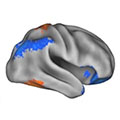Science News About Bipolar Disorder
- Gene Readouts Contribute To Distinctness of Mental Disorders
-
A new study conducted by researchers at NIMH suggests that differences in the expression of gene transcripts – readouts copied from DNA that help maintain and build our cells – may hold the key to understanding how mental disorders with shared genetic risk factors result in different patterns of onset, symptoms, course of illness, and treatment responses.
- NIMH’s Carlos Zarate Jr., M.D., Elected to National Academy of Medicine
-
Carlos Zarate Jr., M.D., chief of the Experimental Therapeutics and Pathophysiology Branch within the NIMH Intramural Research Program, has been elected to the National Academy of Medicine.
- Outdoor Light Linked with Teens’ Sleep and Mental Health
-
A large-scale study of U.S. teens shows associations between outdoor, artificial light at night and health outcomes.
- 2,000 Human Brains Yield Clues to How Genes Raise Risk for Mental Illnesses
-
PsychENCODE researchers are discovering the biological mechanisms by which mental illness risk genes work in the human brain.
- Dynamic Associations Among Motor Activity, Sleep, Energy, and Mood Could Suggest New Focus for Depression Treatment
-
A new study looking at interactions among sleep, energy, activity level, and mood suggests that instability in activity and sleep systems could lead to mood changes. The findings suggest new targets for depression treatment.
- Inflammation in Pregnant Moms Linked to Child’s Brain Development
-
High levels of maternal inflammation during pregnancy have been linked to effects in children, including reduced brain circuit communications and altered long-distance brain wiring at birth, poorer cognitive function at one year – and to reduced impulse control and working memory at two years.
- Molecular Secrets Revealed: Antipsychotic Docked in its Receptor
-
Scientists have deciphered the molecular structure of a widely-prescribed antipsychotic docked in its key human brain receptor. The discovery may hold clues to designing better treatments for schizophrenia, bipolar disorder and other mental illnesses.







